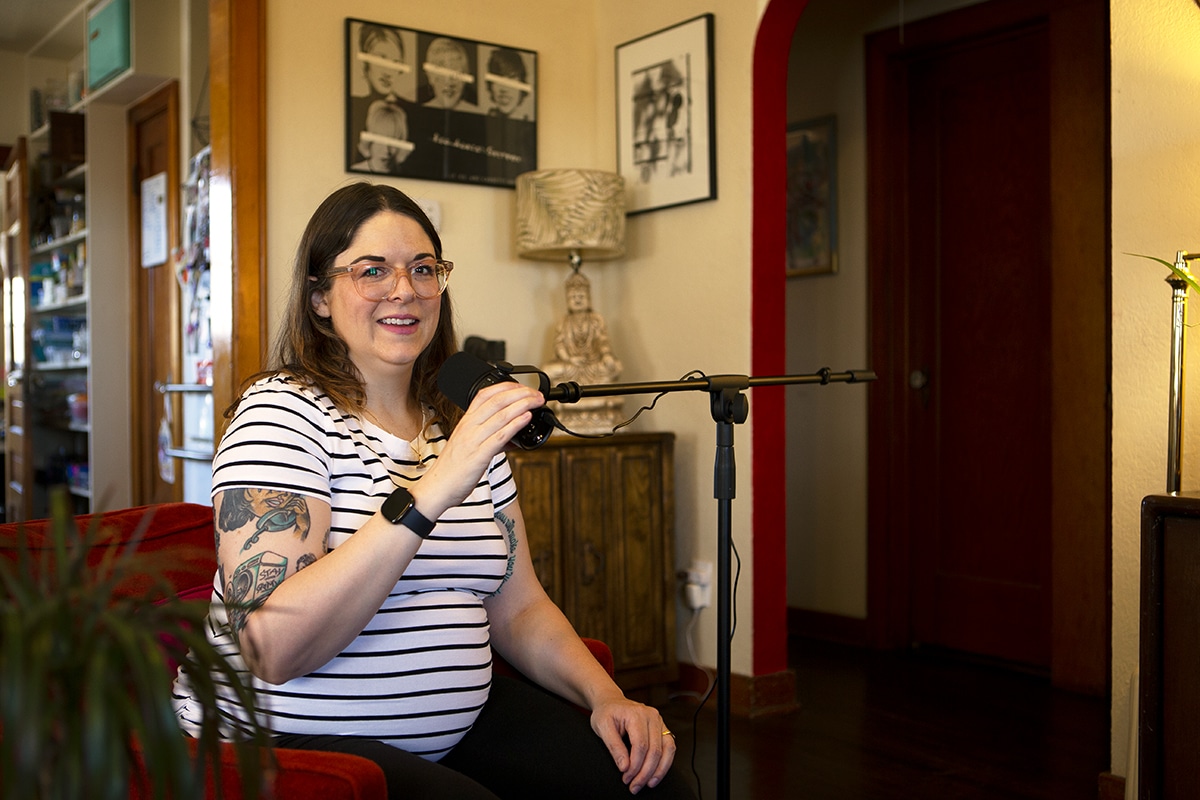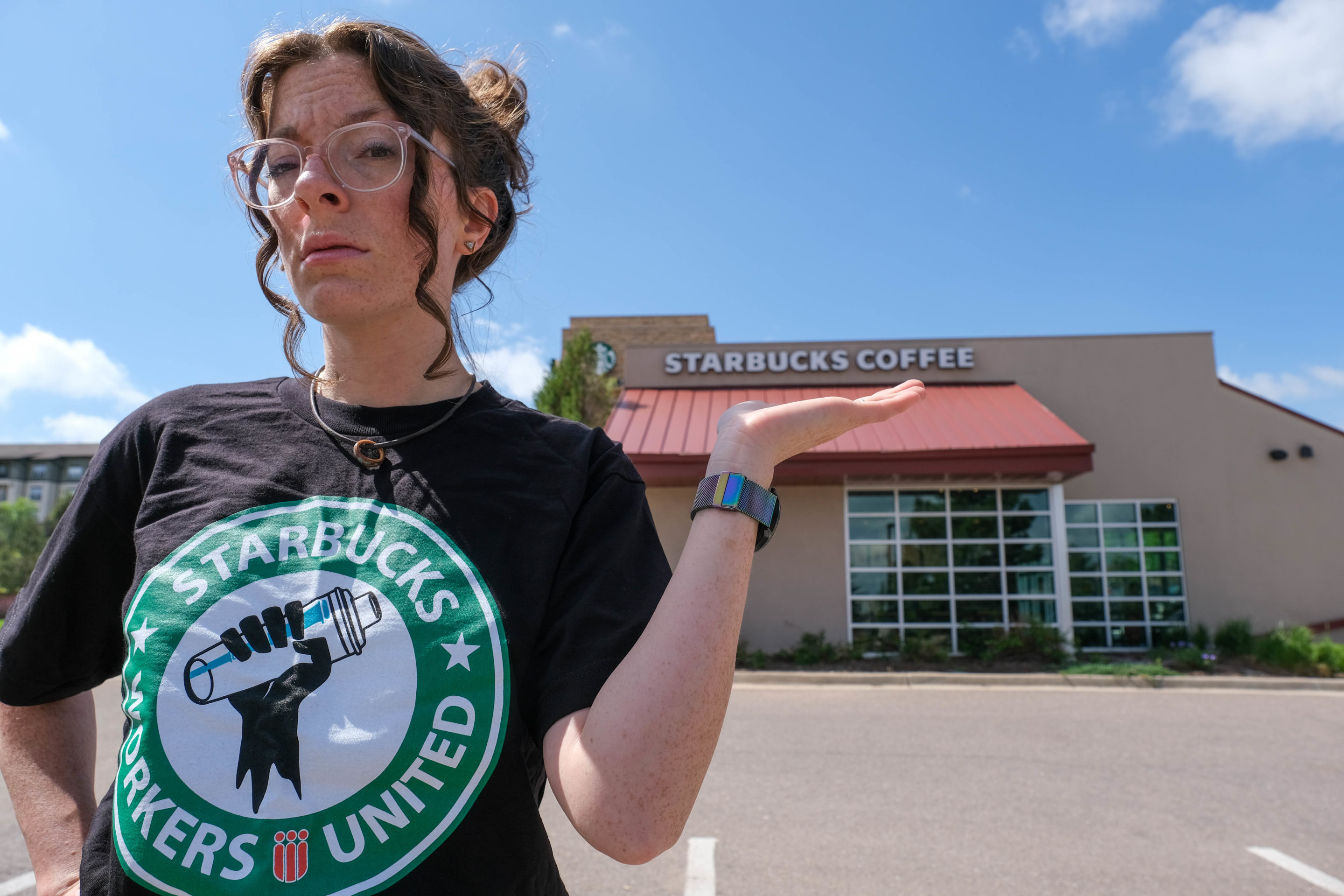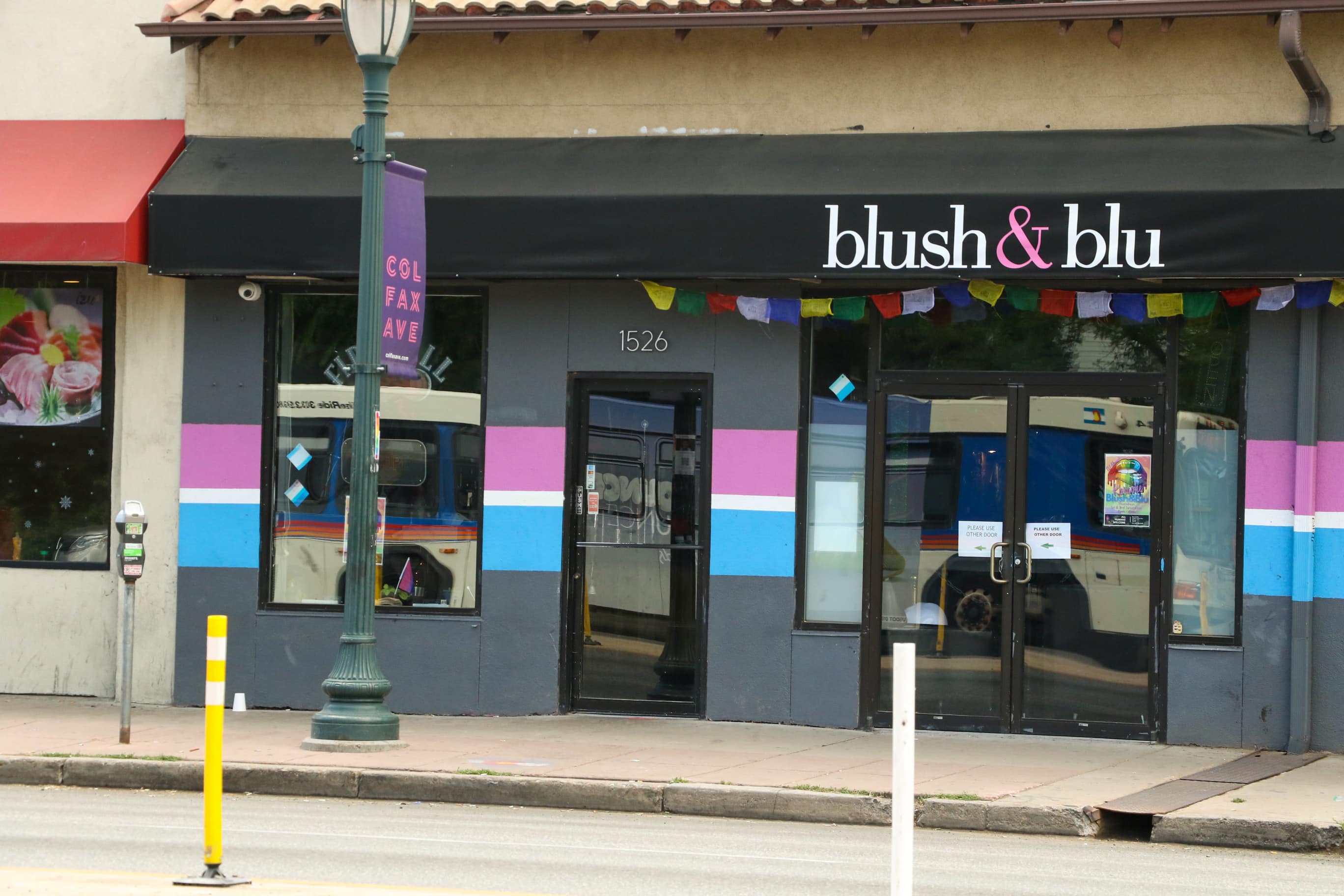//Bree Davies, host of City Cast Denver, at her Denver home on Apr. 3. Davies records the daily podcast remotely. Photo by Ali Mai | [email protected]
The name Bree Davies is as well-known to her fellow journalists as it is with DIY artists and political activists. She has long been a major voice in Denver.
Her extensive resume is an indication that Davies is unable to sit still for long. She’s worn many hats in her time as a journalist covering Denver’s music scene—as producer and host for PBS12’s Sounds on 29th Street and an alt-weekly arts columnist at Westword. She started the podcast “Hello? Denver? Are You Still There?”
Outside journalism, Davies has worked as an activist and advocate for artists, affordable housing, accessibility and anti-racism. She helped found the experimental art and music festival Titwrench Collective and was a staff member of Kalyn Heffernan’s 2019 Denver mayoral campaign. Over the last several years she took a detour into urban planning and city politics.
Then she was offered a job working as the host of the newly-launched City Cast Denver, which was slated to hit earbuds on March 25. Working alongside the podcast’s producers, Paul Karolyi and Xandra McMahon and newsletter editor Peyton Garcia, Davies has another platform to breathe new life into Denver’s media landscape.
A week after City Cast’s rollout, Ms. Mayhem’s editor Madison Lauterbach spoke with Davies about her experience as a woman in journalism, her work as an advocate for Denver’s marginalized communities and her hopes for the new podcast.
This Q&A has been edited for length and clarity.
You’re an MSU Denver alumni also. I don’t want to bash my own school, but it’s kind of seen as the “poor kids’ school” and the journalism and communication program is ranked 530 of 585 in the country. Why is it important that middle and lower-income people have access to being journalists?
I mean, we bring perspectives that are so crucial to the larger conversation. Lived experiences are one of the best ways to back up your work, frankly. Like if you’ve experienced something directly, then there couldn’t be a better expert I think, to talk about or address something. When I went to MSU Denver, it was a much smaller school at that point. What I loved about it was, it’s a school for everybody. So you might be in school with like, you know, a pregnant mom or someone who’s a retired teacher who’s coming back to school, or someone who’s never experienced higher education and they’re in their fifties or sixties. But also you get first-timers like myself.
So along those lines, why is it important for newsrooms to employ women, LGBTQ+, people of color, people with disabilities and those from other marginalized groups?
I mean, again, it goes back to lived experience. We tell the stories that we are tapped into or that we are closest connected to. So if your newsroom is one demographic of person, and as we know, newsrooms have been made up of mostly white men—upper middle class, white men—for a really long time. And there are some great journalists out there—I studied a lot of those journalists as a student.
What I realized was I had a voice from my experiences that directly informed the writing that I was doing and that really resonated with readers. I have a lot of friends in the disability community, cause that just tends to be where my friend group intersects. Their experiences in the world just as my friends have taught me more than any friendships that I’ve had anywhere else. So what a perfect example of a person to be in a newsroom and share that information with a whole readership of people.
Diverse newsrooms just mean better news. Like you’re getting more perspectives and we all have connections in our community. Someone might talk to us that wouldn’t talk to another reporter.
I don’t know if you experienced this too, but I had a lot of professors telling me that I shouldn’t ever voice my opinion, especially online. Like I should basically be a journalist robot essentially. Did you experience that at all?
I got really lucky in that I didn’t. I can’t speak to my journalism student experience because I don’t remember. It was so long ago. I know I had some really incredible teachers and honestly, most of them were women. But I could see where that would be—I think your experience is definitely more common.
As I moved into journalism, the majority of people I worked for were women. Like I worked for [Patricia] Calhoun at Westword. She’s a badass, she doesn’t take shit from anybody. And then when I went to work at PBS12, my producer and mentor Heather Dalton has always been 100% behind everything that I’m doing. I worked for The Onion, they used to have an outpost here for The A.V. Club and my editor there, Tuyet Nguyen, was like the best person I could possibly have to work under.
I’ve always written from a first-person perspective. I’ve always just had an opinion and been lucky enough to be supported, to say, ‘your opinion is valid and people really want to hear it.’ But I understand that’s not a common experience.
Along those lines, your podcast “Hello? Denver? Are You Still There?” was more from the activist perspective. What do you think about journalists intersecting with social activism? Is it something that is inherent in the job, that some journalists are going to be activists as well?
I think when you end up covering something for a long time or you get involved in a community, there’s no way to not be involved in it as a journalist.
I came from arts and culture as a reporter, but the more I got involved in issues around things that were impacting artists, like affordable housing, the more I realized that involving people in this conversation about our city makes them feel empowered to do more. The more armed you are with information, the more likely you are to go get involved in a cause or an organization. I’ve never been a hard news reporter. I’ve done a little bit here and there, but I’ve always kind of walked that fine line because when I see something that is unjust, I can’t not talk about it. I’m somebody that brings those issues to the community and says, ‘this is what I think about them, but this is how you should also figure out how you feel about them.’
So you’ve briefly talked about this, but I haven’t really seen it mentioned in other publications. Can we talk about your sobriety? My mom was an alcoholic and cocaine addict, and I watched her struggle with the disease for years. What made you want to get sober and what are the challenges that you’ve faced? Especially in the journalism industry, which has a major drinking reputation.
Totally. So I had this moment where—it was I think 2006—I lost my apartment. I couldn’t afford my apartment anymore, because I was drunk all the time. I was a ‘functioning’ alcoholic. It was probably one of the darkest times in my life. I wasn’t writing, I wasn’t in a band. I wasn’t involved in the community at all. I was working as a waitress, barely going to school. It took me eight years to get my Bachelor’s degree.
So I had to move home and my family had a sort of intervention with me at dinner one night where they were like, ‘we think you have a drinking problem.’ And we were at a restaurant! I’ll never forget, it was the last night I was ever drunk. I was at Armida’s doing karaoke and I think I sang the Spice Girls song ‘2 Become 1.’ I drank so much that I blacked out and I woke up the next morning on the floor of my bedroom at my mother’s house. I’m 25 years old. I have a cut on my arm. I have no clue what happened. And I was like, ‘Whoa, I should probably get my shit together a little bit.’ So I was like, I’m going to stop drinking for a week. A week went by, and it was hard. [I had] night sweats, like the whole withdrawal, all of that. I was a mess. But then after a week, I was like, ‘Hmm, I maybe could do this for two weeks, cause clearly, I have a problem.’ So I quit drinking for two weeks and then two weeks turned into a month. And then after about a month, I was like, ‘I think that this is how I need to live my life.’
I feel very lucky that I came to that conclusion. But part of it was, I had stable housing. I lived with my mother, I had my own space. I didn’t have to work, she took care of most of the bills and that’s why I was able to do that. Most people don’t have that option.
I really want to talk about what your experience as a young female journalist was. Especially because you’re more alternative, you’ve got tattoos. I know in my experience, I have definitely felt talked down to by the veterans of the industry. What are your experiences with that?
I’m not a traditional journalist in the way that I cover things. So I’m not taken seriously by larger institutions for sure. I’ve never worked for a newspaper not as a freelance person.
But I’ve had some of those experiences too, I have been talked down to. I’ve been brought into situations where it’s like, ‘Oh, we have this new website we’re launching, we want you to write for us, but also I’m going to be a creep to you on the side.’ Luckily my creep meter is really sensitive, so if anybody is creepy to me, I’m like, ‘I’m out.’ It is definitely a common problem. But again, I feel very lucky. The majority of the people I’ve worked with have been women or non-creepy dudes.
Moving on to City Cast, how did you get hooked up with the gig?
So I sort of took a detour for a couple of years and worked in urban planning. I learned about how community input can impact the building of a new park or what your role is when your neighborhood is getting a new development. I was thinking about going back to school for urban planning. And then City Cast called and was like, ‘can we interview you for this position?’ I was like, ‘I’m not looking for work.’ I didn’t grasp that it was, like, a full-on podcast that had this great infrastructure.
But my lead producer, Paul Karolyi, was the one that connected with me. I had been on his show, Changing Denver, before and I trusted his voice. I trusted his work. I’m like, if Paul is involved in this, this has gotta be a pretty cool thing. So I did a series of interviews and exercises for City Cast, and then I realized that they were asking me to apply for a full-time job in journalism. I’ve never had that. They hired me and I was pulled right back out of urban planning and put into media again.
Paul mentioned that he perceived one of the comments made by another journalist announcing you as City Cast’s Denver host as sexist. The journalist said the podcast “settled” for you as host. How do you feel about that comment?
You know, it was interesting cause I have a pretty good rapport with [that journalist], so I didn’t necessarily pick up on it as being super sexist. But looking at it again, it’s like, yeah, I guess they did ‘settle’ for me. This was actually highly competitive. I was interviewed five times and I did four different audio extras. I mean, it wasn’t just like, they came to me and were like, ‘Well, I guess you’re the only person we have.’ There were other really competent people in the running.
It just reminded me that there’s still a little bit of gatekeeping that can happen. Why is it so surprising that we might be launching another news outlet? [The journalist] was clear in his skepticism to me about that aspect of it. But it didn’t strike me as much as it struck Paul. I have not always been embraced by more mainstream news outlets. What’s funny is I’m not taken seriously, but people take my information and turn it into stories all the time.
What’s it like adapting to general news coverage from arts and culture?
It’s crazy. Daily news, in general, is a whole different ball game. I’ve never worked in a daily capacity ever, so just getting into a mindset of covering news every day, and paying more attention to what is going on in the world in this moment is totally different. But I kind of love it. I like that we can mix hard news, serious stories with more fun stories.
You’re seven and a half months pregnant right now. What is it like starting this new adventure while you’re bringing life into the world?
It’s my first kid. It’s not what I imagined! It was funny because that was one of my initial resistance to this thing, was like, do I take a full-time job right now? My automatic response to something is to challenge it and be like, ‘I don’t think I should do this.’ That’s how I know I should really do it. My husband is super supportive, and we just decided together that I can handle this. And the team I have is so fucking awesome, everybody’s really accomodating. I felt like, okay, I made the right decision. This is the right place for me to be because of their support for us as human beings.
[When the time comes], I’ll be off the show for two months. The rest of the team will be filling in for me while I’m gone. I’m excited that [the audience] will get to hear from more voices on our team and more perspectives, because like we’ve been talking about this whole conversation, everybody brings a different perspective to the work that they do.
What do you hope City Cast brings to Denver, and what are your goals with the podcast?
I want us to build a devoted listener base. I want us to have an audience that is as wide as we possibly can get it. I want people to feel connected to it and say, ‘I listen to this every morning because it brings something valuable to my life or my perspective about Denver.’ That’s my goal with it—how do we reach as many listeners as possible and then, in turn, inspire people to do cool things with the city themselves.
Enjoyed this story? Help us keep the lights on! Supporting local press ensures the stories you want to read keep coming, become a member for free today! Click here.





0 Comments